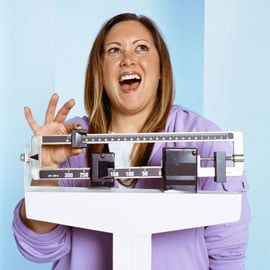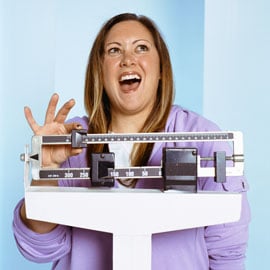 Though many of us think about weight loss in terms of numbers, your body is not a calculator, computer or checking account. We may count calories, exercise minutes and the days we’ve been on a diet plan, but the scale is rarely a good indicator of the weight that your bariatric surgeon and weight loss surgery have helped you lose.
Though many of us think about weight loss in terms of numbers, your body is not a calculator, computer or checking account. We may count calories, exercise minutes and the days we’ve been on a diet plan, but the scale is rarely a good indicator of the weight that your bariatric surgeon and weight loss surgery have helped you lose.
Because of increases in muscle mass, fluctuations in water weight and the slow but steady pace of healthy weight loss, our scales usually don’t show us the numbers we want to see—and this can make us crazy. While some people choose to stay off the scale to avoid discouragement, it’s unrealistic to think that you won’t want to weigh yourself to gauge your progress. Watching the scale can make it feel like you’re just treading water, but it can also show you how well you’ve been staying afloat.
You don’t have to live in fear of the scale, nor do you have to skip regular weigh-ins to stay happy. You can learn to love your scale, keeping it in your arsenal as a powerful weight loss tool. Here are some tips for repairing the relationship between you and your least favorite electronic ally.
Remind yourself of what that little number actually means.
The number on your scale doesn’t define you as a person. It doesn’t predict how much weight you’ll eventually lose, how you feel, what others think about you or even the way you feel about yourself. It’s just a number. Sure, it tells you how much you weigh at the moment, but that doesn’t give it the ability to condense all of your progress into one three-digit figure.
If you find yourself frequently frustrated by the scale’s reading, you may need to adjust your expectations. Have a discussion with your bariatric surgeon about how much weight you can reasonably expect to lose by certain points in your journey, then consider your progress on the scale according to those guidelines. Remember that a less-than-ideal number on the scale does not mean that your efforts have been for nothing; sticking to your diet and lifestyle changes after weight loss surgery will help you lose weight and will help you become healthier. Just stick to your guns and stay patient—your perseverance will pay off.
Make the scale work for you.
Your scale is a tool, not some cynical judge of your progress. Remind yourself of this each time you step on the scale and reinforce your resolve by thinking of all the reasons you want to lose weight, all of the benefits that slimming down will give your body. Then, set about using the scale as a tool to track your path to success.
Organize your weigh-ins with a journal, computer spreadsheet or other tool that puts your progress into a fixed visual medium. Because you won’t notice much difference day to day, it may be best to stick with weighing yourself just once a week, or even once a month. When you weigh yourself, write down the number, but also note how many calories you ate during that time period versus how many calories you burned with exercise.
Putting things in perspective like this may help you spot issues that are contributing to the scale’s refusal to move—too little exercise, too many calories—or may help you see how little the scale can sometimes tell you about what you’re doing to shape up. Though it may be more difficult to regularly measure your body fat percentage, taking this figure into account can also do wonders for making sense of your scale, as it will show you how much fat you’ve burned compared to your overall body weight.
If you see the scale in your bathroom as a fearsome foe, you might just need to change the way you’re looking at it. The scale is a notoriously unreliable way to measure weight loss progress, but will serve you far better as an intermittent tool than a frequent antagonist.
How else can we use the scale to properly measure progress? Share your experiences, tips and questions with us in the comments below!


